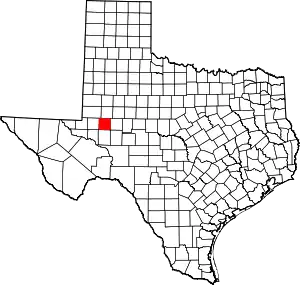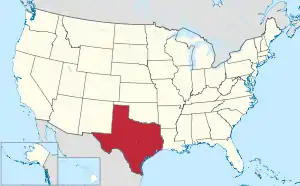Midland County, Texas
Midland County is a county located in the U.S. state of Texas. As of 2020, the population was 169,983.[1] The county seat is Midland.[2] The county is so named for being halfway (midway) between Fort Worth and El Paso on the Texas and Pacific Railway. Midland County is included in the Midland, TX Metropolitan Statistical Area as well as the Midland–Odessa Combined Statistical Area.
Midland County | |
|---|---|
.JPG.webp) The Midland County Courthouse in Midland | |
 Seal | |
 Location within the U.S. state of Texas | |
 Texas's location within the U.S. | |
| Coordinates: 31°53′N 102°01′W | |
| Country | |
| State | |
| Founded | 1885 |
| Named for | Midland, Texas |
| Seat | Midland |
| Largest city | Midland |
| Area | |
| • Total | 902 sq mi (2,340 km2) |
| • Land | 900 sq mi (2,000 km2) |
| • Water | 1.8 sq mi (5 km2) 0.2% |
| Population (2020) | |
| • Total | 169,983 |
| • Density | 190/sq mi (73/km2) |
| Time zone | UTC−6 (Central) |
| • Summer (DST) | UTC−5 (CDT) |
| Congressional district | 11th |
| Website | www |


History
In 1968, the county lost before the Supreme Court in Avery v. Midland County which required local districts to be nearly equal. The city of Midland had most of the county's population but only elected one of the five county commissioners, which was found to violate the Fourteenth Amendment.
Geography
According to the U.S. Census Bureau, the county has a total area of 902 square miles (2,340 km2), of which 900 square miles (2,300 km2) is land and 1.8 square miles (4.7 km2) (0.2%) is water.[3] The Spraberry Trend, the third-largest oil field in the United States by remaining reserves, underlies much of the county.[4]
Major highways
Adjacent counties
- Martin County (north)
- Glasscock County (east)
- Upton County (south)
- Ector County (west)
- Andrews County (northwest)
- Reagan County (southeast)
Demographics
| Census | Pop. | Note | %± |
|---|---|---|---|
| 1890 | 1,033 | — | |
| 1900 | 1,741 | 68.5% | |
| 1910 | 3,464 | 99.0% | |
| 1920 | 2,449 | −29.3% | |
| 1930 | 8,005 | 226.9% | |
| 1940 | 11,721 | 46.4% | |
| 1950 | 25,785 | 120.0% | |
| 1960 | 67,717 | 162.6% | |
| 1970 | 65,433 | −3.4% | |
| 1980 | 82,636 | 26.3% | |
| 1990 | 106,611 | 29.0% | |
| 2000 | 116,009 | 8.8% | |
| 2010 | 136,872 | 18.0% | |
| 2020 | 169,983 | 24.2% | |
| U.S. Decennial Census[5] 1850–2010[6] 2010[7] 2020[8] | |||
| Race / Ethnicity | Pop 2010[7] | Pop 2020[8] | % 2010 | % 2020 |
|---|---|---|---|---|
| White alone (NH) | 72,822 | 76,487 | 53.20% | 45.00% |
| Black or African American alone (NH) | 8,675 | 10,465 | 6.34% | 6.16% |
| Native American or Alaska Native alone (NH) | 552 | 686 | 0.40% | 0.40% |
| Asian alone (NH) | 1,639 | 3,891 | 1.20% | 2.29% |
| Pacific Islander alone (NH) | 42 | 152 | 0.03% | 0.09% |
| Some Other Race alone (NH) | 211 | 621 | 0.15% | 0.37% |
| Mixed Race/Multi-Racial (NH) | 1,331 | 4,350 | 0.97% | 2.56% |
| Hispanic or Latino (any race) | 51,600 | 73,331 | 37.70% | 43.14% |
| Total | 136,872 | 169,983 | 100.00% | 100.00% |
Note: the US Census treats Hispanic/Latino as an ethnic category. This table excludes Latinos from the racial categories and assigns them to a separate category. Hispanics/Latinos can be of any race.
As of the census[9] of 2000, there were 116,009 people, 42,745 households, and 30,947 families residing in the county. The population density was 129 people per square mile (50 people/km2). There were 48,060 housing units at an average density of 53 units per square mile (20/km2). The racial makeup of the county was 77.32% White, 6.98% Black or African American, 0.64% Native American, 0.93% Asian, 0.03% Pacific Islander, 12.17% from other races, and 1.92% from two or more races. 29.03% of the population were Hispanic or Latino of any race.
There were 42,745 households, out of which 38.90% had children under the age of 18 living with them, 57.40% were married couples living together, 11.40% had a female householder with no husband present, and 27.60% were non-families. 24.20% of all households were made up of individuals, and 8.60% had someone living alone who was 65 years of age or older. The average household size was 2.68 and the average family size was 3.21.
In the county, the population was spread out, with 30.20% under the age of 18, 8.80% from 18 to 24, 28.40% from 25 to 44, 20.90% from 45 to 64, and 11.60% who were 65 years of age or older. The median age was 34 years. For every 100 females there were 93.40 males. For every 100 females age 18 and over, there were 89.40 males.
The median income for a household in the county was $39,082, and the median income for a family was $47,269. Males had a median income of $36,924 versus $24,708 for females. The per capita income for the county was $20,369. 12.90% of the population and 10.30% of families were below the poverty line. Out of the total people living in poverty, 16.20% are under the age of 18 and 7.90% are 65 or older.
Oil and gas industry
Midland County ranks #1 in the state of Texas for total oil production and #2 for total gas production.[10] Oil and gas data from the Texas Railroad Commission reports 6,602 currently producing wells as of September 2020.[11]
Politics
Midland County was one of the first areas of Texas to turn Republican, beginning with native son Dwight D. Eisenhower's campaign for the presidency in 1952. The last Democratic presidential candidate to win the county was Harry Truman in 1948.[12] Even in the presidential election of 1964 in which the incumbent president, Texan Democrat Lyndon B. Johnson, won a national landslide victory, it gave 57.8% of its ballots to Republican presidential candidate and Arizona native Barry Goldwater.[13] This is the last time a Democrat managed 40 percent of the county's vote, and one of only two since 1948 that a Democrat has won even 30 percent of the vote. Despite this, conservative Democrats held most local offices well into the 1980s.
Midland County is located in Texas's 11th congressional district, represented by Republican August Pfluger. The 11th Congressional District gave George W. Bush 78% of its votes in 2004, higher than any other congressional district in the nation.
| Year | Republican | Democratic | Third party | |||
|---|---|---|---|---|---|---|
| No. | % | No. | % | No. | % | |
| 2020 | 45,624 | 77.34% | 12,329 | 20.90% | 1,035 | 1.75% |
| 2016 | 36,973 | 75.13% | 10,025 | 20.37% | 2,214 | 4.50% |
| 2012 | 35,689 | 79.85% | 8,286 | 18.54% | 722 | 1.62% |
| 2008 | 36,155 | 78.13% | 9,691 | 20.94% | 428 | 0.92% |
| 2004 | 36,585 | 81.60% | 8,005 | 17.85% | 244 | 0.54% |
| 2000 | 31,514 | 79.30% | 7,534 | 18.96% | 692 | 1.74% |
| 1996 | 25,382 | 68.01% | 9,513 | 25.49% | 2,425 | 6.50% |
| 1992 | 24,143 | 58.39% | 9,160 | 22.15% | 8,044 | 19.45% |
| 1988 | 30,618 | 77.86% | 8,487 | 21.58% | 221 | 0.56% |
| 1984 | 33,706 | 82.13% | 7,214 | 17.58% | 119 | 0.29% |
| 1980 | 25,027 | 76.55% | 6,839 | 20.92% | 826 | 2.53% |
| 1976 | 19,178 | 70.52% | 7,725 | 28.41% | 292 | 1.07% |
| 1972 | 18,905 | 79.60% | 4,388 | 18.48% | 457 | 1.92% |
| 1968 | 12,789 | 55.07% | 4,756 | 20.48% | 5,677 | 24.45% |
| 1964 | 11,906 | 57.78% | 8,646 | 41.96% | 53 | 0.26% |
| 1960 | 11,343 | 64.28% | 5,842 | 33.11% | 460 | 2.61% |
| 1956 | 8,287 | 69.99% | 3,468 | 29.29% | 86 | 0.73% |
| 1952 | 7,956 | 71.04% | 3,244 | 28.96% | 0 | 0.00% |
| 1948 | 1,410 | 36.93% | 2,032 | 53.22% | 376 | 9.85% |
| 1944 | 302 | 10.31% | 1,688 | 57.63% | 939 | 32.06% |
| 1940 | 646 | 25.14% | 1,921 | 74.75% | 3 | 0.12% |
| 1936 | 190 | 13.31% | 1,229 | 86.06% | 9 | 0.63% |
| 1932 | 136 | 9.70% | 1,245 | 88.80% | 21 | 1.50% |
| 1928 | 347 | 49.57% | 350 | 50.00% | 3 | 0.43% |
| 1924 | 44 | 9.84% | 399 | 89.26% | 4 | 0.89% |
| 1920 | 68 | 19.94% | 271 | 79.47% | 2 | 0.59% |
| 1916 | 24 | 6.47% | 339 | 91.37% | 8 | 2.16% |
| 1912 | 10 | 4.08% | 215 | 87.76% | 20 | 8.16% |
Communities
Cities
- Midland (county seat) (small part in Martin County)
- Odessa (partly in Ector County)
Ghost towns
- Dameron City
- Germania
- Pleasant
- Prairie Lee
- Slaughter
Education
School districts:[15]
Most areas in the county are within the service area of Midland College; however the Greenwood area is not within the Midland College service area.[16]
See also
- List of museums in West Texas
- National Register of Historic Places listings in Midland County, Texas
- Recorded Texas Historic Landmarks in Midland County
- Gary Painter, sheriff of Midland County from 1985 until his death in 2019
References
- "Midland County, Texas". United States Census Bureau. Retrieved February 23, 2021.
- "Find a County". National Association of Counties. Retrieved June 7, 2011.
- "2010 Census Gazetteer Files". United States Census Bureau. August 22, 2012. Retrieved May 4, 2015.
- Top 100 Oil and Gas Fields Archived 2009-05-15 at the Wayback Machine
- "Decennial Census by Decade". US Census Bureau.
- "Texas Almanac: Population History of Counties from 1850–2010" (PDF). Texas Almanac. Archived (PDF) from the original on October 9, 2022. Retrieved May 4, 2015.
- "P2 HISPANIC OR LATINO, AND NOT HISPANIC OR LATINO BY RACE - 2010: DEC Redistricting Data (PL 94-171) - Midland County, Texas". United States Census Bureau.
- "P2 HISPANIC OR LATINO, AND NOT HISPANIC OR LATINO BY RACE - 2020: DEC Redistricting Data (PL 94-171) - Midland County, Texas". United States Census Bureau.
- "U.S. Census website". United States Census Bureau. Retrieved May 14, 2011.
- "Texas Monthly Oil & Gas Production by County Ranking". Texas RRC. Retrieved March 13, 2021.
- "Well Distribution by County - Well Counts". Texas RRC. Retrieved March 13, 2021.
- "Presidential election of 1948 - Map by counties". geoelections.free.fr.
- "Dave Leip's Atlas of U.S. Presidential Elections - Data Graphs".
- Leip, David. "Dave Leip's Atlas of U.S. Presidential Elections". uselectionatlas.org. Retrieved July 27, 2018.
- "2020 CENSUS - SCHOOL DISTRICT REFERENCE MAP: Midland County, TX" (PDF). U.S. Census Bureau. Archived (PDF) from the original on October 9, 2022. Retrieved April 25, 2022.
- Texas Education Code, Sec. 130.188. MIDLAND COMMUNITY COLLEGE DISTRICT SERVICE AREA.